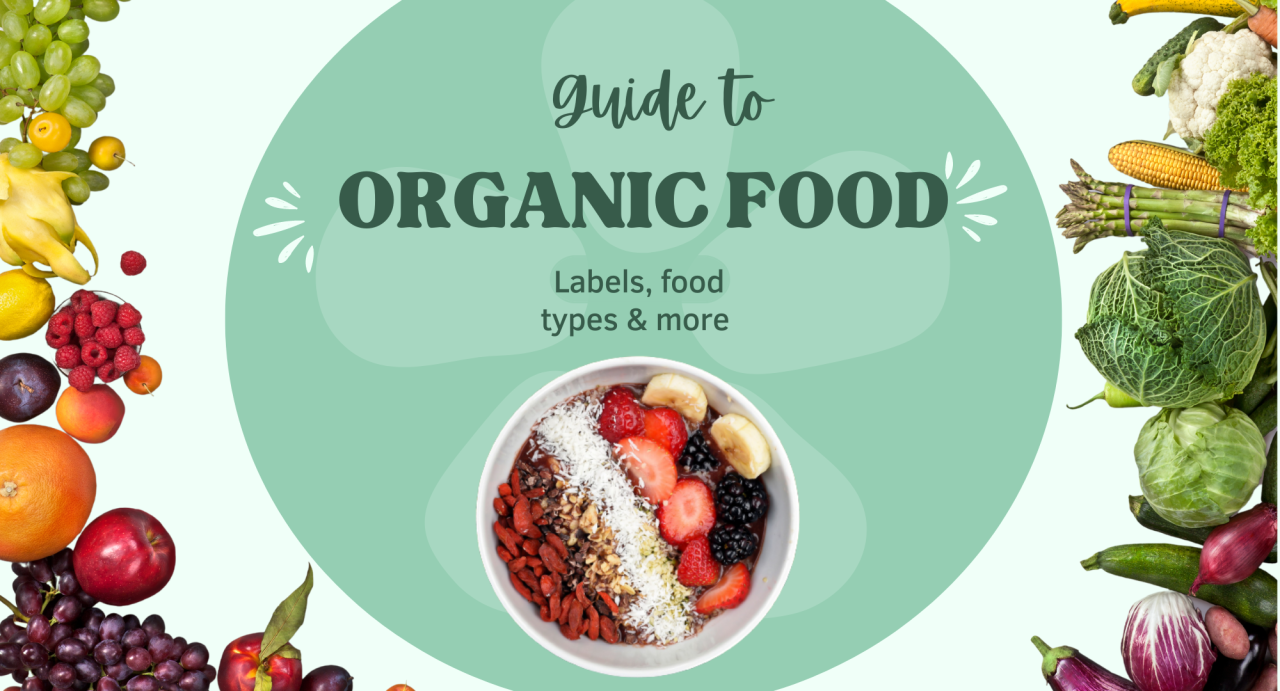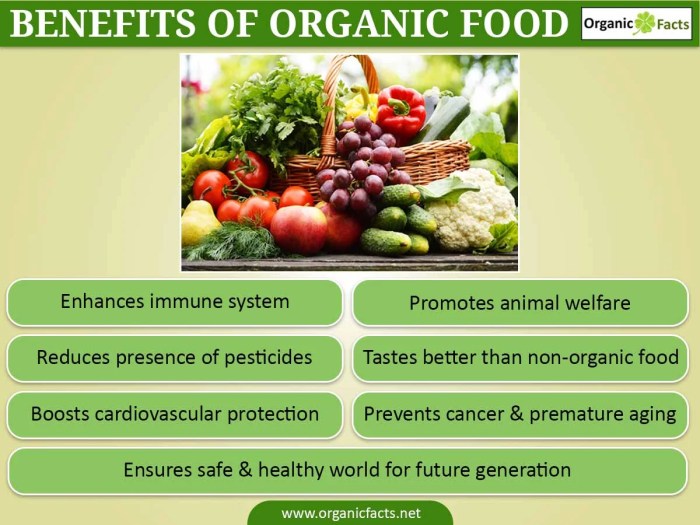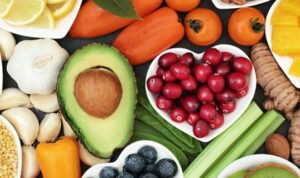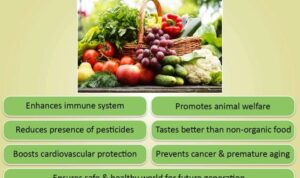Organic food benefits are not just a trend, they are a lifestyle choice that can have a significant impact on your health and the environment. From the nutritional advantages to the environmental impact, organic food offers a range of benefits that are worth exploring.
As we delve deeper into the world of organic food, we uncover the reasons why choosing organic can be a game-changer for your well-being and the planet.
Health Benefits of Organic Food

Organic food is known to have several health benefits compared to conventionally grown food. One of the key differences lies in the nutritional content.
Nutritional Content Differences
Organic produce tends to have higher levels of certain vitamins, minerals, and antioxidants compared to conventionally grown counterparts. Studies have shown that organic fruits and vegetables can have up to 50% more antioxidants than non-organic varieties.
Specific Nutrients in Organic Produce
- Organic fruits and vegetables are often richer in vitamin C, vitamin E, and beta-carotene, all of which are essential for a healthy immune system and overall well-being.
- Minerals like magnesium, iron, and calcium are also more abundant in organic produce, contributing to better bone health and overall body function.
Health Risks of Pesticides
One of the main reasons people opt for organic food is to avoid exposure to harmful pesticides commonly used in conventional farming. Pesticides have been linked to various health issues, including cancer, hormone disruption, and neurological problems.
Environmental Impact of Organic Farming
Organic farming practices have a positive impact on the environment by helping to preserve soil quality and reduce erosion. By avoiding the use of synthetic pesticides and fertilizers, organic farmers protect the health of the soil and promote its long-term sustainability.
Benefits of Crop Rotation and Natural Fertilizers
Crop rotation is a common practice in organic agriculture that involves planting different crops in a sequential pattern on the same piece of land. This helps to break pest and disease cycles, improve soil structure, and enhance nutrient availability. Natural fertilizers, such as compost and manure, are used to replenish soil nutrients and promote healthy plant growth without the harmful effects of synthetic chemicals.
Contribution to Biodiversity Conservation
Organic farming plays a crucial role in conserving biodiversity by creating habitats for a wide range of plant and animal species. By avoiding the use of chemical inputs that can harm beneficial insects and pollinators, organic farmers help to maintain a healthy ecosystem on their farms. This, in turn, supports the overall biodiversity of the surrounding areas and promotes a more sustainable and resilient environment.
Organic Food Production Standards

Organic food production standards play a crucial role in ensuring the integrity and quality of organic products. Let’s explore how different countries regulate organic food production, the certification bodies involved, and the importance of transparent labeling.
Regulations in Different Countries
In the United States, the Department of Agriculture (USDA) oversees the National Organic Program (NOP), which sets the standards for organic food production. These standards include requirements for soil quality, animal welfare, and the use of synthetic pesticides and fertilizers. In the European Union, organic food production is regulated by the European Commission, which enforces strict guidelines on organic farming practices and the use of organic ingredients.
Certification Bodies
Certification bodies play a key role in ensuring that organic standards are met by producers. Examples of well-known certification bodies include the USDA Organic Seal in the United States, the Soil Association in the UK, and Ecocert in France. These organizations conduct inspections and audits to verify that farmers and food producers comply with organic regulations before awarding the organic certification.
Importance of Transparency in Labeling
Transparent labeling is essential for consumers to make informed choices about the food they purchase. Organic products must be clearly labeled with the certification logo of the governing body to indicate that they meet organic standards. This label provides assurance to consumers that the product has been produced in accordance with organic regulations, without the use of synthetic chemicals or genetically modified organisms.
Cost and Accessibility of Organic Food: Organic Food Benefits
Organic food is often priced higher than conventional products due to various factors such as higher production costs, limited availability, and certification requirements. However, there are ways to make organic food more affordable for consumers and initiatives that aim to increase access to organic food in low-income communities.
Factors Influencing Price Difference, Organic food benefits
- Higher production costs: Organic farming practices require more labor and resources, leading to higher production costs compared to conventional farming.
- Limited availability: The demand for organic products may exceed the supply, resulting in higher prices due to scarcity.
- Certification requirements: Organic farmers must adhere to strict standards and undergo costly certification processes, adding to the overall cost of organic food.
Tips to Make Organic Food More Affordable
- Buy in bulk: Purchasing organic items in bulk can help reduce the cost per unit and save money in the long run.
- Shop seasonally: Opting for organic produce that is in season can be more affordable and fresher than out-of-season items.
- Grow your own: Consider growing your own organic fruits, vegetables, or herbs at home to save on costs and ensure quality.
Initiatives for Accessibility in Low-Income Communities
- Community gardens: Establishing community gardens in low-income areas can provide access to fresh, organic produce for residents.
- Subsidized programs: Some organizations offer subsidized organic food programs to make healthy options more accessible to those with limited financial resources.
- Food assistance programs: Integrating organic options into existing food assistance programs can help low-income individuals access nutritious organic food.


